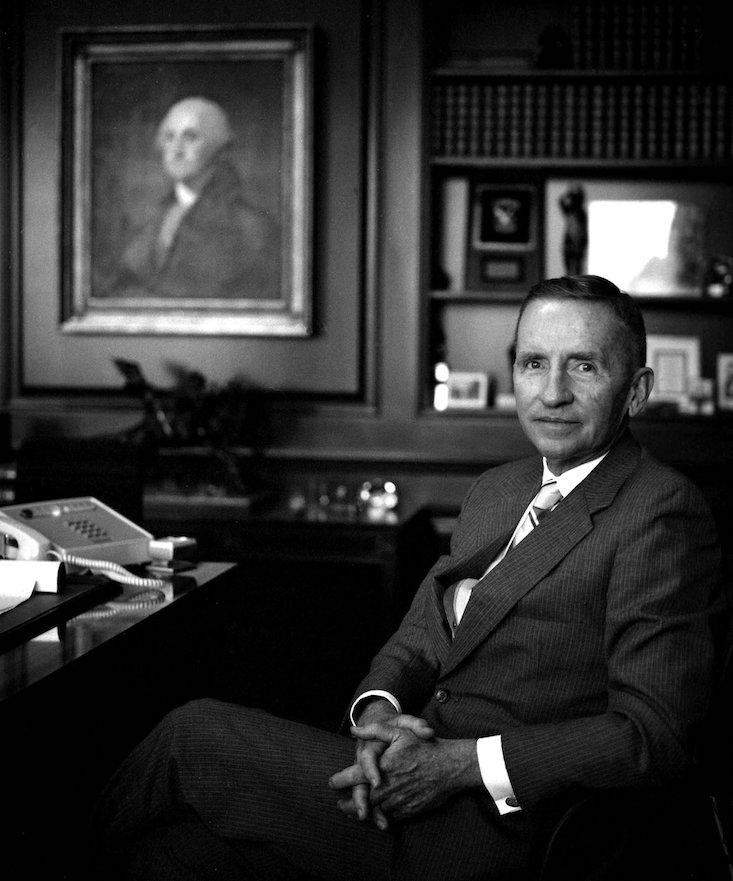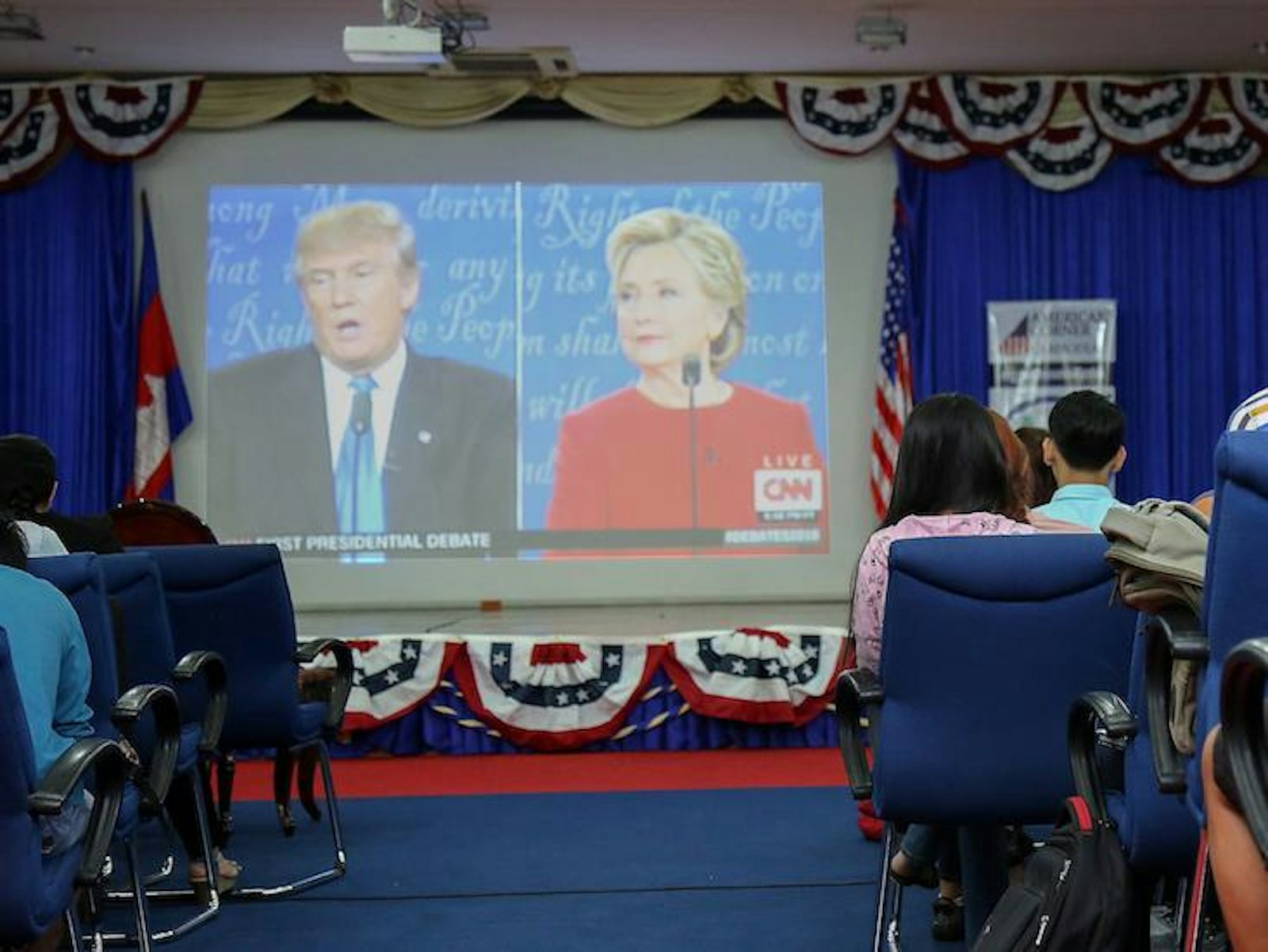The Lebanese-Canadian professor of marketing Gad Saad (both sound like “sad”) can readily defend evolutionary psychology against the charge that it’s a convenient, “just-so story.” (Before diving in, he said, “Forgive me, it’s going to be a bit long-winded, because your question is an important one.”) He founded and developed the field of “evolutionary consumption” after realizing that the principles of evolutionary psychology could be used to study consumer behavior, and now he holds the Research Chair in Evolutionary Behavioral Sciences and Darwinian Consumption at Concordia University, in Montreal. “Humans are consummatory animals with rapacious appetites,” he’s written in his “Homo Consumericus” blog on Psychology Today. “Much of what we do short of breathing and sleeping involves some consumption act.”
Of late, because of the United States presidential election, among other things, he’s been—you might say “consumed”—by politics. He discusses it on his YouTube channel, “The Saad Truth,” where his followers know him as “The Gadfather.” But politics is not a new interest. In 2003, he published a book chapter in Human Nature and Public Policy on the topic, called “Evolution and Political Marketing,” in which he argued that evolutionary psychology is the best way to explain the factors at work when voters choose their candidates.
Nautilus recently spoke to Saad about how we can understand politicians, and the ways they advertise their messages, through an evolutionary lens.
What is the link between consumerism and politics?
I define consumption very broadly. It’s not just consuming Coca-Cola and Starbucks. We consume religious narratives, for example, and political candidates. They’re products. In this case, the candidates are packages of personal attributes. We’re choosing a product—one that probably is going to have a much greater effect on my personal life than which diet cola I buy tomorrow. In that sense, of course, political marketing is just a sub-branch of marketing in general. The politicians are certainly marketing themselves, and we are making a consumer choice when we decide between Donald Trump and Hillary Clinton.
Where does evolutionary theory come in?
We look at the types of attributes that people seek in their political candidates, and see if any of those attributes are what we would expect from an evolutionary perspective. Height, facial features, voice: These are all evolutionary signatures that we know from mating research are profoundly important. All other things equal, we would expect those particular cues to matter. Ross Perot, if you remember him, was an independent candidate who, if I can be charitable or somewhat untactful, had not won the genetic lottery. Therefore, I didn’t really have to hear much from him before I could say, “He is extremely unlikely to win, if only because he doesn’t exhibit some of these signatures that matter from an evolutionary perspective.”

Is it rational that physical features have so much influence over our behavior?
We’re visual animals. Something like 80 percent of our stimuli is processed through our visual sense. Of course, it might be considered irrational that we’re thinking about physical characteristics. In some cases, we as the populace and the electorate use another evolutionary principle, called fast and frugal heuristics. A heuristic is a rule of thumb—a shortcut. They’re usually evolutionarily adaptive. Imagine if an animal had to sit and process every possible consequence of every possible action. The computational complexity would be very high. It’d probably be eaten by a predator while calculating all the consequences. Developing these mental shortcuts can result in optimal decisions, but sometimes they can backfire.
Can experts use these basic heuristics to predict winners of elections?
In 2004, I saw Barack Obama on the Charlie Rose Show. At the time, he was running for Senate. The next day, I was speaking to a very good friend of mine. I said, “Remember my words. I’ve identified who will become president of the United States.” What did I use as rules? There was nothing that he said that had any substance, just like any other politician. But guess what? He exudes all the right things. He’s got a mellifluous voice. He’s got a beautiful smile. He’s tall. He’s cool. He’s got popular cultural references. You know what? He looks like a leader. If you ask people, even sophisticated people, to truly offer substantive reasons why they like him or don’t like him, most couldn’t tell you. But my God, does he look the part. And therefore, I will choose him, using my fast and frugal characteristics.
Are there other fast and frugal rules that voters use to decide between specific candidates?
There’s something called the lexicographic rule, the overwhelmingly most commonly applied decision rule. Why? Because it is cognitively non-effortful. It says: The one that scores better on my most important attribute is the one that I will choose. Let’s say for me, it’s immigration policy. If Donald Trump scores a 9 out of 10 on immigration, and Hillary Clinton scores a 7 out of 10, Donald Trump is better. On that issue alone, I choose Donald Trump, even though if I had looked at all of the other information, I would have chosen Hillary Clinton.
It takes a lot of effort for me to sift through the 17,000 attributes. Again, from a normative perspective—from a homo economicus, rational man perspective—that’s what I should do, because I don’t leave any information on the table. But most of us don’t have the time or energy or desire to sift through all that information, and so we use these simplifying heuristics. If immigration is really important to me, screw everything else.
Can you explain why some people vote against their own best interests?
There are multiple reasons, but to give one: inertia of behavior. If I voted for the Democrats for the past 70 years through my ancestry, then I will stick to it despite evidence that suggests it is not in my best interest. I see it even amongst my academic friends. These are people who are obviously intellectually sophisticated, but they become babbling morons when it comes to supporting their candidate of choice. They vilify the other side. I don’t have a dog in the fight, so I’m always amazed at how people can think this way. “I decide that I am a Democrat and I’m progressive. That’s a part of my personhood. Any sensible liberal justice-seeking person is a Democrat. Therefore, I don’t need to hear more.” That’s why these political debates are really for the undecided. It’s for the undecided that we’re really playing all this theater.
The scope of evolutionary theories is so grand that it should be easy to falsify the hypothesis.
How do you approach the evolutionary psychology of consumers and voters without creating a “just-so” story?
This is probably the most common canard that we hear about evolutionary psychology. First is the distinction between proximate and ultimate explanations. If you want to study pregnancy sickness, you can study endless proximate questions, like: “How do the fluctuating levels of a woman’s hormones affect the severity of her sickness symptoms?” The ultimate, Darwinian question is, “Why would women have evolved that particular physiological mechanism?”
Evolutionary psychologists also build what are called nomological networks of cumulative evidence—a multitude of evidence coming from disparate lines. Number one, you establish human universals. You go to the Yanomami tribe in the Amazon, which has not been exposed to media images, and the members will point to exactly the same woman. It’s not as though you only run it in your undergraduate lab at Ohio State.
Number two, you demonstrate through medical studies that women who have the hourglass figure are more likely to fall pregnant. They’re less likely to be diseased. Epidemiologically, you can establish that there’s greater reproductive fitness of women that possess that hourglass figure. We could also do studies where we look at art pieces, let’s say statues, in extraordinarily different cultures—ancient Greece, ancient Egypt, India, Africa—and do a content analysis of those statues. Guess what? They have that hourglass figure. You could do studies using fMRI brain imaging of men, and show that their pleasure centers are more likely to have higher activation patterns when they are exposed to those images. You could take congenitally blind men, men who have never had the gift of sight, and you could show that those men haptically, through touch, will prefer the women with the hourglass figure.
That should already be giving you goosebumps, and I haven’t gone through all the evidence. If someone wants to falsify it, then bring the data, but until then, evolutionary theory has a much higher threshold of evidence that it seeks to establish than the other sciences. Once you construct the full nomological network, then it becomes impossible to argue otherwise.
Is evolutionary theory, in a sense, “too big to fail?”
The scope of evolutionary theories is so grand that it should be easy to falsify the hypothesis. It’s unfalsifiable not because, epistemologically, it’s a just-so story, it’s because it’s true. Since Darwin, endless people have spent their entire careers trying desperately to falsify, and they haven’t. That’s because Darwin is right. The fact that my 2003 book chapter is 13 years old doesn’t matter, because we can go to this chapter in 1300 years, and I’d like to think that it would still be relevant. I wouldn’t expect some of those realities to change unless there are select certain pressures that change the way our brain works.
Dr. Kiki Sanford holds a Ph.D. in Molecular, Cellular and Integrative Physiology from U.C. Davis, and is a specialist in learning and memory. She is also the founder and host of the radio show This Week in Science.
Watch: Darwin combined what the developmental psychologist Howard Gardner called “multiple intelligences.”

The lead image is courtesy of LLP Photo Archive via Flickr.






























